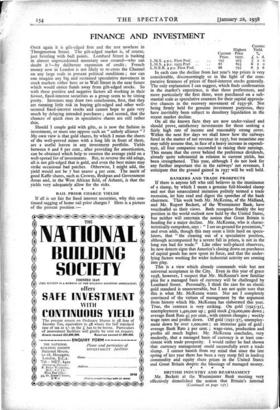BANKERS AND TRADE PROSPECTS
If there is anyone left who still believes in the imminence of a slump, by which I mean a genuine full-blooded slump and not that emasculated imitation politely termed a trade recession, let him read and digest the speeches of the bank chairmen. This week both Mr. McKenna, of the Midland, and Mr. Rupert Beckett, of the Westminster Bank, have vouchsafed us their views. Both recognise frankly the key position in the world outlook now held by the United States, but neither will entertain the notion that Great Britain is heading for a major decline. Mr. McKenna, who is charac- teristically outspoken, says : " I see no ground for pessimism," and even adds, though this may seem a little hard on specu- lators, that " the clearing out of a speculative position, although accompanied by a severe fall in prices, is not in the long run bad for trade." Like other well-placed observers, he now detects signs that America's closing down on purchases of capital goods has now spent its force, and that the under- lying factors working for wider industrial activity are coming into play.
This is a view which already commands wide but not universal acceptance in the City. Even in this year of grace 1938, however, I suspect that Mr. McKenna's now familiar plea for a managed basis of currency will be challenged by Lombard Street. Personally, I think the case for an elastic gold standard is unanswerable, but I am not quite sure that this is what Mr. McKenna wants. Nor am I completely convinced of the virtues of management by the argument from history which Mr. McKenna has elaborated this year. True, the contrast is very striking. On gold (1925-31), unemployment 1,400,000 up ; gold stock £19,000,000 down ; average Bank Rate 4i per cent., with sixteen changes ; weekly wage rates and profits down. Off gold (1931-37), unemploy- ment down by over r,000,000 ; an immense gain of gold ; average Bank Rate 2 per cent. ; wage-rates, production and profits all much higher. Mr. McKenna concludes, very modestly, that a managed basis of currency is at least con- sistent with trade prosperity. I would rather he had shown that currency management could successfully avert a trade slump. I cannot banish from my mind that since the late spring of last year there has been a very steep fall in leading commodity and equity share prices in the United States and Great Britain despite the blessings of managed money.


















































 Previous page
Previous page